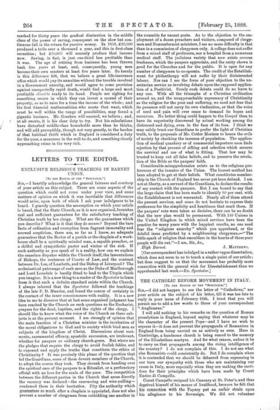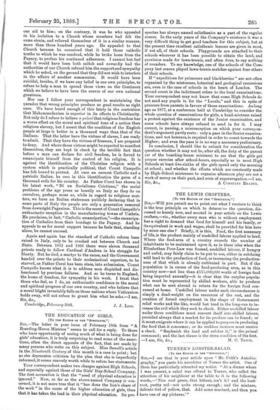THE CATHOLIC REFORM MOVEMENT IN ITALY.
pro THE EDITOR OF THE "SPECTATOR."] Slit,-I did not happen to see the letter of " Catholicus," nor your article on the subject of his letter, till it was too late to reply in your issue of February 18th. I trust that you will permit me to add a few words to those of your correspondent " Anglicanns."
I will add nothing to his remarks on the question of Roman proselytism in England, beyond saying that whatever may be the character of the present Pope—and I have no wish to asperse it—it does not prevent the propaganda of Romanism in England from being carried on as actively as ever. Here in Cambridge, a handsome church is being reared to the memory of the Elizabethan martyrs. And for what reason, unless it be to carry on that propaganda among the rising intelligence of the country P I do not complain of this. I do not see what else Romanists could consistently do. But I do complain when it is contended that we should be debarred from expressing in our turn our sympathy with those who are maintaining our cause in Italy, more especially when they are making the sacri- fices for their principles which have been made by Count Enrico di Campello.
Count Campello resigned his Canonry at St. Peter's, and thus deprived himself of his means of livelihood, because be felt that his connection with the Papacy put an unfair strain upon his allegiance to his Sovereign. We did not volunteer
our aid to him ; on the contrary, it was he who appealed in his isolation to a Church whose members had felt the same strain, and relieved themselves of it in a similar manner, more than three hundred years ago. He appealed to that Church because he conceived that it held those catholic truths to which he was resolved, while he broke loose from the Papacy, to profess his continued adherence. I cannot but feel that it would have been both selfish and cowardly had the authorities of our Church refused him the support and sympathy which he asked, on the ground that they did not wish to interfere in the affairs of another communion. It would have been suicidal, besides, if we have any belief in our own principles, to refuse to help a man to spread those views on the Continent which we believe to have been the source of our own national greatness.
Nor can I follow your correspondent in maintaining the paradox that wrong principles produce as good results as right ones. We have heard enough of this lately in the contention that Mahommedanism is superior in its effects to Christianity. Not only do I refuse to believe a priori that religious freedom has a worse effect on the moral and spiritual tone of a nation than religious slavery, but I assert that the condition of the English people at large is better in a thousand ways than that of the Italians. That the latter have the virtues of slaves, I am ready to admit. That they have the virtues of freemen, I am prepared to deny. And where those virtues might be expected to manifest themselves, they are kept in check by the terrible fact that before a man can declare for civil freedom, he is forced to emancipate himself from the control of his religion. It is against the identification of the Christian religion with a system which is practically political, that Count Campello has felt bound to protest. At once an earnest Catholic and a patriotic Italian, he sees in this identification the germ of a thousand evils for his country. As Father Curd has shown in his latest work, "Di un Socialism° Cristiano," the social problems of the age press as heavily on Italy as they do on -ourselves, perhaps more so, while in regard to religions mat- ters, we have an Italian statesman publicly declaring that in some parts of Italy the people are only a generation removed from downright Paganism. This is the secret of Count Campello's enthusiastic reception in the manufacturing towns of Umbria. He proclaims, in fact," Catholic emancipation,"—the emancipa- tion of Catholics from their bondage to the Papacy. And he appeals to us for moral support because he feels that, standing alone, be cannot succeed.
Again and again has the standard of Catholic reform been raised in Italy, only to be crushed out between Church and State. Between 1862 and 1866 there were eleven thousand priests ready to follow Cardinal d'Andrea in his struggle for liberty. But he died, a martyr to the cause, and the Government handed over the priests to their ecclesiastical superiors, to be starved, as Father Curd has been since, into submission. Count Campello knows what it is to address men dispirited and dis- heartened by previous failures. And so he turns to England, the home of freedom, for sympathy in his work. I trust that those who feel, as I do, an enthusiastic confidence in the moral and spiritual progress of our own country, and who believe that a moral blight invariably falls on those nations where Vaticanism holds sway, will not refuse to grant him what he asks.—I am, Sir, &c.,







































 Previous page
Previous page